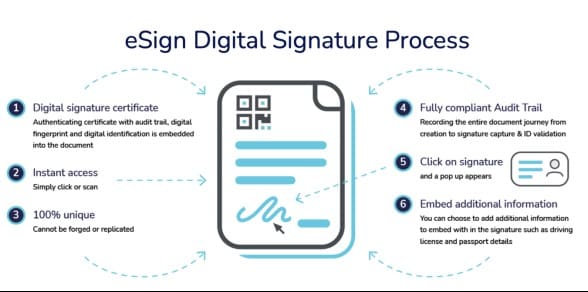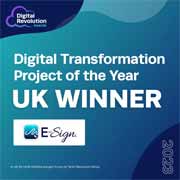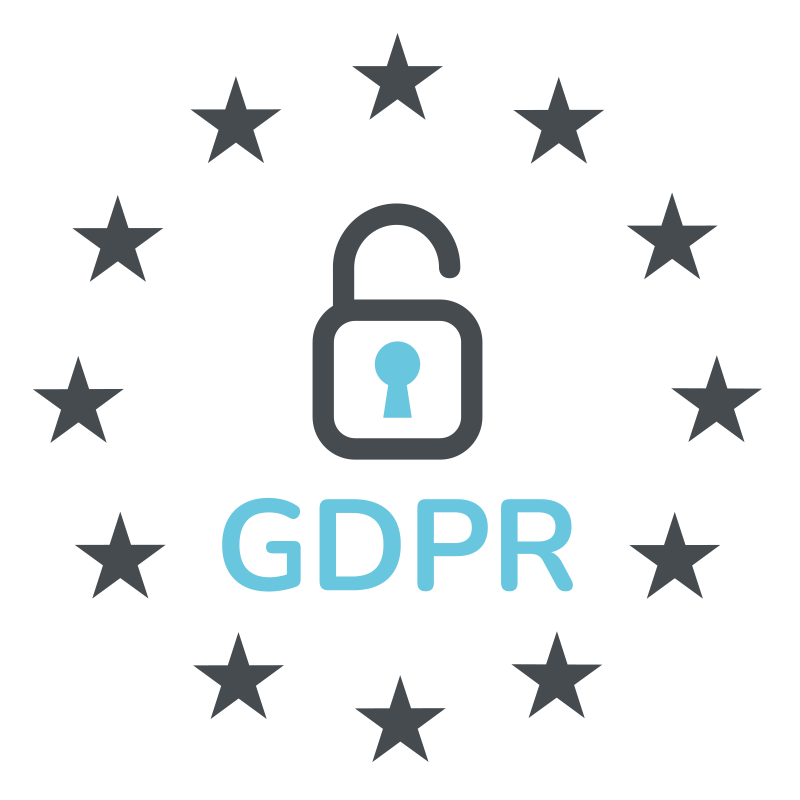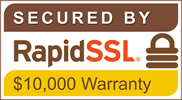Home | News & Insights |
Everything you Need to Know About Electronic Signatures
Desislava Topuleva
Customer Success Manager
PUBLISHED
14th March, 2024
Contents
If you’ve never used one before, the prospect of electronically signing a document might seem quite daunting. However, electronic signatures are easy to use and highly secure, even more secure than the traditional handwritten signature in fact. They also enable businesses to reduce risks, save resources and build a better customer and employee experience.
There are many other benefits of utilising eSignatures, which we will be exploring in this guide, as well as covering all the key topics you need to know such as the legalities, how they work and the benefits. So, you can confidently implement an eSignature solution in your business.
What is an Electronic Signature?
An electronic signature is when a digital element or impression is used by an individual to confirm their agreement to the contents of an online document. Unlike the traditional ‘wet’ or handwritten signature, an eSignature comes with additional layers of security that make it practically impossible to forge. An electronic signature can be applied from any location and any device, speeding up the document signing process significantly. This makes them an increasingly popular and commonly used method of signing documents into today’s modern business landscape.
How do eSignatures Work?
There are different types of eSignatures which work in slightly different ways, however, generally, this technology uses Public Key Infrastructure (PKI). This means that each signature is specifically linked to the signer via a unique private key, and their identity can be verified by an attached unique digital certificate. A digital certificate is a file that proves the authenticity of a device, server, or user through the use of cryptography and the PKI.

Are eSignatures Legally Binding?
This is one of the main questions people ask when it comes to e-signatures, which is understandable as you want to ensure that any document you sign or send to someone else to sign is considered as legally admissible as a handwritten signature. The good news is that yes, electronic signatures are legally binding, with several countries now having regulations in place to support their use. We’ll be exploring some of these regulations in more detail below.
UK and EU law


Electronic signatures have been legally binding in the UK since 2000, when the Electronic Communication Act was introduced. They have also been part of European law since 2016 through the eIDAS regulation. The eIDAS regulation established the framework to ensure that electronic interactions between businesses are safer and more efficient. The regulation applies to both the UK and Europe but was amended for the UK in 2018 when it withdrew from the European Union.
The purpose of eIDAS is to enforce the specific requirements providers must follow in order to gain a qualified status and increase confidence for users that are considering using electronic signatures. However, even with this regulation in place, there was still uncertainty surrounding the use of eSignatures. Much of this uncertainty was resolved in 2019 when the Law Commission confirmed the validity and legality of electronic signatures in executing documents, including documents where there is a statutory requirement for a signature.
United States law

In the United States, there are three main laws that cover the use of eSignatures: the Electronic Signatures in Global and National Commerce (ESIGN) Act, the Uniform Electronic Transactions Act (UETA), and the Digital Signature and Electronic Authentication Law. The ESIGN Act is the predominant regulation for eSignatures, allowing their use in all 50 states when federal law applies. Under the Act, an e-signature is defined as an electronic sound, symbol, or process that is attached to or associated with a document, and executed or adopted by an individual with the intent to sign and be legally bound by the signature.
How Secure are eSignatures?

For any business that is using a digital platform or solution, security is a key priority and concern. However, with further technological advancements in security, users can feel fully assured that their electronic signature is compliant with the highest security standards and regulations. At E-Sign we understand the importance of protecting your data, which is why we go above and beyond to ensure our digital solutions maximise the safety of your signatures and document transactions. We do this in multiple ways.
Digital Certificates
Digital certificates are one of the most important security features of electronic signatures as it contains information about the identity of the individual or organisation that is signing the document. This information is checked and supported by a verified third party known as a Certificate Authority (CA). Once the CA confirms the signer’s identity, they issue the digital certificate that contains the signer’s public key. The public key is then used to verify the authenticity of a signature.
Encryption
Another essential security measure for electronic signatures is encryption. Encryption involves scrambling data so that it can only be read by the person or organisation who has the decryption key. When a document is electronically signed, the signature is encrypted using the signer’s private key. Therefore, the signature can only be verified by someone who has the signer’s public key.
E-Sign’s Security Standards
To find out more about our security measure and protocols, please visit our Trust Centre.
What are the Different Types of Electronic Signatures?
There are three main types of electronic signatures: basic, advanced, and qualified.
Basic
A basic signature is the easiest to implement but is also the least secure as there is no identity verification required. The signature can be added to the document by anyone who opens it, whether that is by drawing the signature, typing it, ticking a checkbox, or uploading an image. Basic signatures are legally binding in some instances, but due to the lack of verification, they can be more at risk of being forged. Therefore, they are typically best utilised on non-official documents that won’t have significant legal bearing.
Advanced
Advanced signatures offer more security than basic, as each one has an electronic seal that is specifically linked to each signer. This means the signer can be formally identified, as they are sent for additional verification using an electronic registered delivery service (ERDS). By transmitting them through an ERDS, audit trails and other evidence can be provided, ensuring the authenticity of the signature and the signer’s identity. In terms of legality, advanced electronic signatures are recognised as equally valid and legally binding as a handwritten signature.
Qualified
Qualified electronic signatures (QES) are another secure form of signature, but they have additional identity verification steps, to meet the relevant requirements and allow them to reach qualified status. This means the signing process often involves more than one method of verification, using both encrypted keys and two-factor authentication.
A trusted QTSP (Quality Trust Service Provider) accredited third party will vet the signers before they can add their signature, which can be done face to face, remotely via an online video chat, or in person.
Both advanced and qualified eSignatures meet the highest industry standards, as they each provide every user with their own unique key that is directly linked to the signer’s identity. You can have complete peace of mind that the signature is valid and secure when using either type of eSignature for your documents.
What are the Benefits of eSignatures?
There are several benefits of switching to eSignatures for your document processes, including:
- Reduce paper use – moving away from paper-based processes will help your business become much more efficient. Going paperless can also contribute to your sustainability goals as you won’t have to waste paper by printing, hand signing, and scanning documents back in.
- Save time – using electronic signatures can significantly reduce your document turnaround times, thanks to the convenience of signing within a few minutes rather than potentially hours or days depending on their access to a printer etc. As a result, you can complete documents and close deals much faster.
- Cut unnecessary costs – paper and accessories related to paper processes such as printers, files, fax machines etc, are expensive. But by digitising your document transactions you can reduce or even eliminate the spending associated with paper, freeing up extra budget that can be allocated to other key parts of your business.
- Increase productivity – by removing slow and inefficient paper-based transactions, you can boost productivity within your business through streamlined processes that are quicker and easier for your team to follow.
- Automate operations – with E-Sign, you have the ability to integrate our platform with existing applications you already use, making it simple to create automated workflows and ensure your systems operate seamlessly with each other.
Who Uses Electronic Signatures?
Electronic signatures have been widely adopted across various industries and businesses, with most departments now using digital solutions to eSign documents. For example, some of the industries we work with include:
- Education
- Finance
- Recruitment
- Healthcare
- Government
- Legal
- Real estate
- And more
Each department within these industries can benefit from using eSignatures. In the real estate sector for instance, electronic signatures can be used to securely sign tenancy agreements, mortgage applications, and other vital documents involved in buying and selling properties.
Also, many businesses in several sectors use signature solutions to eSign contracts, such as a business contract proposal, or an employment contract. If you’re looking to save time on sending contracts but want to ensure they are legally compliant, E-Sign offers a range of pre-built contract templates to our users.
The Environmental Benefits of eSignatures

As businesses around the world are starting to focus on reducing their carbon emissions to mitigate the alarming effects of climate change, it’s undeniable that an important benefit of eSignatures is reducing the need for paper production. The UK government announced that it has set a target for the UK to be net zero by 2050 and minimising paper usage as much as possible is a crucial step towards achieving this goal. Paper accounts for 26% of the total waste at landfills, which is a percentage that cannot be ignored.
At E-Sign, we’re passionate about supporting businesses in their digital transformation and spreading the message of sustainability is an integral part of that. There are several negative effects of paper production including increased carbon emissions, additional pollution, and deforestation, with all these factors contributing a lot to the global warming crisis. However, by digitising your document processes and removing paper from your business, you can make a difference and leave the world a better place for future generations.
Even the smallest contribution can make a difference and with that in mind we introduced the E-Sign carbon counter to our document management platform. This allows you to see how much carbon you are saving each month by using our digital solutions, presenting the results on your personalised dashboard. That number might start off small, but as time goes on you can get a more comprehensive picture of your savings and the positive impact your reduced carbon footprint has on the environment.
How E-Sign Can Help
E-Sign is more than just an electronic signature provider, we offer businesses and organisations unified digital solutions that can effectively optimise their document processes. Our services can be tailored to the specific requirements of your business, which is also reflected in our affordable pricing plans, ensuring all your document needs are met within your budget.
We are an industry leading provider, supplying our complete services to a wide range of businesses across several sectors. Want to know how E-Sign can revolutionise your document processes? Contact our friendly sales team today.
Conclusion
We hope this guide has helped you gain a better understanding of eSignatures and their various uses and benefits. If you’d like to try using electronic signatures for yourself but aren’t sure what subscription is right for you just yet, don’t worry. You can experience the benefits of the E-Sign platform for yourself by registering for our 14-day free trial. This will allow you to use and explore the features we have to offer first-hand, so you can determine whether it is right for your business needs.
 Facebook
Facebook
 X (Twitter)
X (Twitter)
 LinkedIn
LinkedIn











